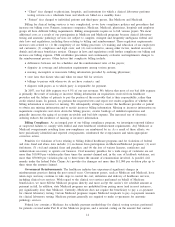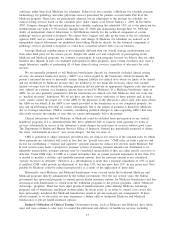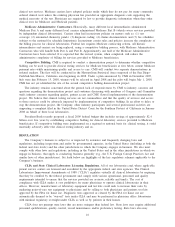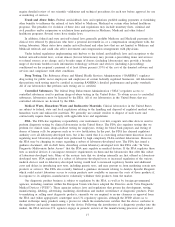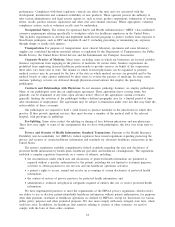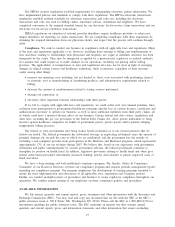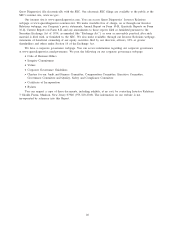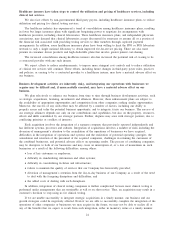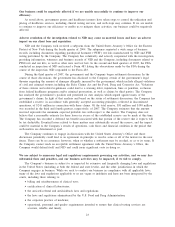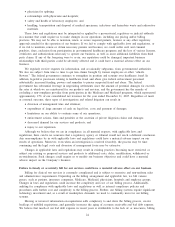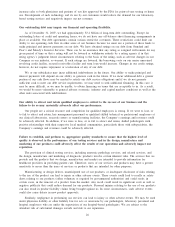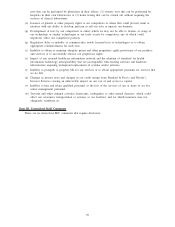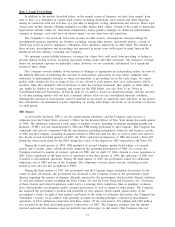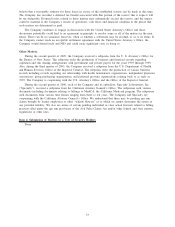Quest Diagnostics 2007 Annual Report Download - page 33
Download and view the complete annual report
Please find page 33 of the 2007 Quest Diagnostics annual report below. You can navigate through the pages in the report by either clicking on the pages listed below, or by using the keyword search tool below to find specific information within the annual report.•physician fee splitting;
•relationships with physicians and hospitals;
•safety and health of laboratory employees; and
•handling, transportation and disposal of medical specimens, infectious and hazardous waste and radioactive
materials.
These laws and regulations may be interpreted or applied by a prosecutorial, regulatory or judicial authority
in a manner that could require us to make changes in our operations, including our pricing and/or billing
practices. We may not be able to maintain, renew or secure required permits, licenses or any other regulatory
approvals needed for the operation of our business. If we fail to comply with applicable laws and regulations, or
if we fail to maintain, renew or obtain necessary permits and licenses, we could suffer civil and criminal
penalties, fines, exclusion from participation in governmental healthcare programs and the loss of various licenses,
certificates and authorizations necessary to operate our business, as well as incur additional liabilities from third
party claims. If any of the foregoing were to occur, our reputation could be damaged, important business
relationships with third parties could be adversely affected and it could have a material adverse effect on our
business.
We regularly receive requests for information, and occasionally subpoenas, from governmental authorities.
We also are subject from time to time to qui tam claims brought by former employees or other “whistle
blowers.” The federal government continues to strengthen its position and scrutiny over healthcare fraud. In
addition, legislative provisions relating to healthcare fraud and abuse give federal enforcement personnel
substantially increased funding, powers and remedies to pursue suspected fraud and abuse. The federal
government has substantial leverage in negotiating settlements since the amount of potential damages far exceeds
the rates at which we are reimbursed for our products and services, and the government has the remedy of
excluding a non-compliant provider from participation in the Medicare and Medicaid programs, which represented
approximately 17% of our consolidated net revenues for the year ended December 31, 2007. Regardless of merit
or eventual outcome, these types of investigations and related litigation can result in:
•diversion of management time and attention;
•expenditure of large amounts of cash on legal fees, costs and payment of damages;
•limitations on our ability to continue some of our operations;
•enforcement actions, fines and penalties or the assertion of private litigation claims and damages;
•decreased demand for our services and products; and
•injury to our reputation.
Although we believe that we are in compliance, in all material respects, with applicable laws and
regulations, there can be no assurance that a regulatory agency or tribunal would not reach a different conclusion.
Any noncompliance by us with applicable laws and regulations could have a material adverse impact on our
results of operations. Moreover, even when an investigation is resolved favorably, the process may be time
consuming and the legal costs and diversion of management focus may be extensive.
Changes in applicable laws and regulations may result in existing practices becoming more restricted, or
subject our existing or proposed services and products to additional costs, delay, modification, withdrawal or
reconsideration. Such changes could require us to modify our business objectives and could have a material
adverse impact on the Company’s business.
Failure to timely or accurately bill for our services could have a material adverse effect on our business.
Billing for clinical test services is extremely complicated and is subject to extensive and non-uniform rules
and administrative requirements. Depending on the billing arrangement and applicable law, we bill various
payers, such as patients, insurance companies, Medicare, Medicaid, physicians, hospitals and employer groups.
Changes in laws and regulations could increase the complexity and cost of our billing process. Additionally,
auditing for compliance with applicable laws and regulations as well as internal compliance policies and
procedures adds further cost and complexity to the billing process. Further, our billing systems require significant
technology investment and, as a result of marketplace demands, we need to continually invest in our billing
systems.
Missing or incorrect information on requisitions adds complexity to and slows the billing process, creates
backlogs of unbilled requisitions, and generally increases the aging of accounts receivable and bad debt expense.
We believe that much of our bad debt expense in recent years is attributable to the lack of, or inaccurate, billing
24


